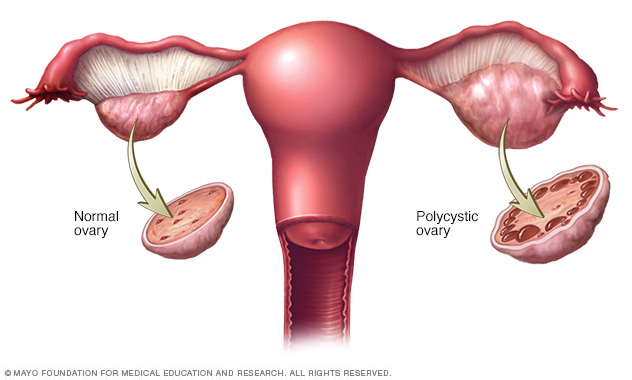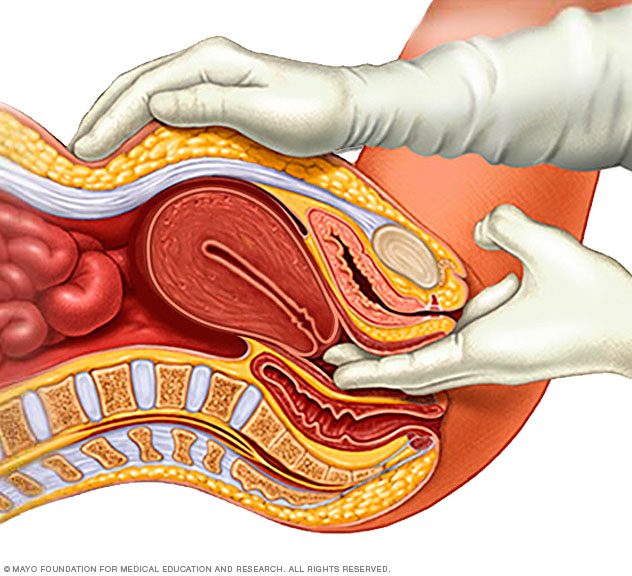Overview
Polycystic ovary syndrome (PCOS) is a problem with hormones that happens during the reproductive years. If you have PCOS, you may not have periods very often. Or you may have periods that last many days. You may also have too much of a hormone called androgen in your body.
With PCOS, many small sacs of fluid develop along the outer edge of the ovary. These are called cysts. The small fluid-filled cysts contain immature eggs. These are called follicles. The follicles fail to regularly release eggs.
The exact cause of PCOS is unknown. Early diagnosis and treatment along with weight loss may lower the risk of long-term complications such as type 2 diabetes and heart disease.

Symptoms
Symptoms of PCOS often start around the time of the first menstrual period. Sometimes symptoms develop later after you have had periods for a while.
The symptoms of PCOS vary. A diagnosis of PCOS is made when you have at least two of these:
- Irregular periods. Having few menstrual periods or having periods that aren't regular are common signs of PCOS. So is having periods that last for many days or longer than is typical for a period. For example, you might have fewer than nine periods a year. And those periods may occur more than 35 days apart. You may have trouble getting pregnant.
- Too much androgen. High levels of the hormone androgen may result in excess facial and body hair. This is called hirsutism. Sometimes, severe acne and male-pattern baldness can happen, too.
- Polycystic ovaries. Your ovaries might be bigger. Many follicles containing immature eggs may develop around the edge of the ovary. The ovaries might not work the way they should.
PCOS signs and symptoms are typically more severe in people with obesity.
When to see a doctor
See your health care provider if you're worried about your periods, if you're having trouble getting pregnant, or if you have signs of excess androgen. These might include new hair growth on your face and body, acne and male-pattern baldness.
Causes
The exact cause of PCOS isn't known. Factors that might play a role include:
-
Insulin resistance. Insulin is a hormone that the pancreas makes. It allows cells to use sugar, your body's primary energy supply. If cells become resistant to the action of insulin, then blood sugar levels can go up. This can cause your body to make more insulin to try to bring down the blood sugar level.
Too much insulin might cause your body to make too much of the male hormone androgen. You could have trouble with ovulation, the process where eggs are released from the ovary.
One sign of insulin resistance is dark, velvety patches of skin on the lower part of the neck, armpits, groin or under the breasts. A bigger appetite and weight gain may be other signs.
- Low-grade inflammation. White blood cells make substances in response to infection or injury. This response is called low-grade inflammation. Research shows that people with PCOS have a type of long-term, low-grade inflammation that leads polycystic ovaries to produce androgens. This can lead to heart and blood vessel problems.
- Heredity. Research suggests that certain genes might be linked to PCOS. Having a family history of PCOS may play a role in developing the condition.
- Excess androgen. With PCOS, the ovaries may produce high levels of androgen. Having too much androgen interferes with ovulation. This means that eggs don't develop on a regular basis and aren't released from the follicles where they develop. Excess androgen also can result in hirsutism and acne.
Complications
Complications of PCOS can include:
- Infertility
- Gestational diabetes or pregnancy-induced high blood pressure
- Miscarriage or premature birth
- Nonalcoholic steatohepatitis — a severe liver inflammation caused by fat buildup in the liver
- Metabolic syndrome — a cluster of conditions including high blood pressure, high blood sugar, and unhealthy cholesterol or triglyceride levels that significantly increase your risk of heart and blood vessel (cardiovascular) disease
- Type 2 diabetes or prediabetes
- Sleep apnea
- Depression, anxiety and eating disorders
- Cancer of the uterine lining (endometrial cancer)
Obesity commonly occurs with PCOS and can worsen complications of the disorder.
Diagnosis
There's no single test to specifically diagnose polycystic ovary syndrome (PCOS). Your health care provider is likely to start with a discussion of your symptoms, medications and any other medical conditions. Your provider also may ask about your menstrual periods and any weight changes. A physical exam includes checking for signs of excess hair growth, insulin resistance and acne.
Your health care provider might then recommend:
- Pelvic exam. During a pelvic exam, your provider can check your reproductive organs for masses, growths or other changes.
- Blood tests. Blood tests can measure hormone levels. This testing can exclude possible causes of menstrual problems or androgen excess that mimic PCOS. You might have other blood testing, such as fasting cholesterol and triglyceride levels. A glucose tolerance test can measure your body's response to sugar (glucose).
- Ultrasound. An ultrasound can check the appearance of your ovaries and the thickness of the lining of your uterus. A wandlike device (transducer) is placed in your vagina. The transducer emits sound waves that are translated into images on a computer screen.
If you have a diagnosis of PCOS, your provider might recommend more tests for complications. These tests can include:
- Regular checks of blood pressure, glucose tolerance, and cholesterol and triglyceride levels
- Screening for depression and anxiety
- Screening for obstructive sleep apnea

Treatment
PCOS treatment focuses on managing the things that are concerning you. This could include infertility, hirsutism, acne or obesity. Specific treatment might involve lifestyle changes or medication.
Lifestyle changes
Your health care provider may recommend weight loss through a low-calorie diet combined with moderate exercise activities. Even a modest reduction in your weight — for example, losing 5% of your body weight — might improve your condition. Losing weight may increase the effectiveness of medications your provider recommends for PCOS, and it can help with infertility. Your health care provider and a registered dietitian can work with you to determine the best weight-loss plan.
Medications
To regulate your periods, your health care provider might recommend:
- Combination birth control pills. Pills that contain both estrogen and progestin decrease androgen production and regulate estrogen. Regulating your hormones can lower your risk of endometrial cancer and correct irregular bleeding, excess hair growth and acne.
- Progestin therapy. Taking progestin for 10 to 14 days every 1 to 2 months can regulate your periods and protect against endometrial cancer. This progestin therapy doesn't improve androgen levels and won't prevent pregnancy. The progestin-only minipill or progestin-containing intrauterine device is a better choice if you also wish to avoid pregnancy.
To help you ovulate so that you can become pregnant, your health care provider might recommend:
- Clomiphene. This oral anti-estrogen medication is taken during the first part of your menstrual cycle.
- Letrozole (Femara). This breast cancer treatment can work to stimulate the ovaries.
- Metformin. This medicine for type 2 diabetes that you take by mouth improves insulin resistance and lowers insulin levels. If you don't become pregnant using clomiphene, your provider might recommend adding metformin to help you ovulate. If you have prediabetes, metformin can slow the progression to type 2 diabetes and help with weight loss.
- Gonadotropins. These hormone medications are given by injection.
If needed, talk with your health care provider about procedures that may help you become pregnant. For example, in vitro fertilization may be an option.
To reduce excessive hair growth or improve acne, your health care provider might recommend:
- Birth control pills. These pills decrease androgen production that can cause excessive hair growth and acne.
- Spironolactone (Aldactone). This medication blocks the effects of androgen on the skin, including excessive hair growth and acne. Spironolactone can cause birth defects, so effective birth control is needed while taking this medication. This medication isn't recommended if you're pregnant or planning to become pregnant.
- Eflornithine (Vaniqa). This cream can slow facial hair growth.
- Hair removal. Electrolysis and laser hair removal are two options for removing hair. Electrolysis uses a tiny needle inserted into each hair follicle. The needle sends out a pulse of electric current. The current damages and then destroys the follicle. Laser hair removal is a medical procedure that uses a concentrated beam of light to remove unwanted hair. You might need multiple treatments of electrolysis or laser hair removal. Shaving, plucking or using creams that dissolve unwanted hair may be other options. But these are temporary, and hair may thicken when it grows back.
- Acne treatments. Medications, including pills and topical creams or gels, may help improve acne. Talk to your health care provider about options.
Lifestyle and home remedies
To help ease the effects of PCOS, try to:
- Stay at a healthy weight. Weight loss can lower insulin and androgen levels. It also may restore ovulation. Ask your health care provider about a weight-control program, if you need one. Meet with a registered dietitian for help in reaching weight-loss goals.
- Limit carbohydrates. High-carbohydrate diets might make insulin levels go higher. Ask your provider if a low-carbohydrate diet could help if you have PCOS. Choose complex carbohydrates, which raise your blood sugar levels more slowly. Complex carbohydrates are found in fruits, vegetables, whole grains and cooked dry beans and peas.
- Be active. Exercise helps lower blood sugar levels. If you have PCOS, increasing your daily activity and getting regular exercise may treat or even prevent insulin resistance. Being active may also help you keep your weight under control and avoid developing diabetes.
Preparing for an appointment
For PCOS, you may see a specialist in female reproductive medicine (gynecologist), a specialist in hormone disorders (endocrinologist) or an infertility specialist (reproductive endocrinologist).
Here's some information to help you get ready for your appointment.
What you can do
Before your appointment, make a list of:
- Symptoms you've been having, and for how long
- Information about your periods, including how often they occur, how long they last and how heavy they are
- All medications, vitamins, herbs and other supplements you take, including the dosages
- Key personal and medical information, including other health conditions, recent life changes and stressors
- Questions to ask your health care provider
Some basic questions to ask include:
- What tests do you recommend?
- How does PCOS affect my chance of getting pregnant?
- Are there any medicines that might help improve my symptoms or chance of getting pregnant?
- What lifestyle changes can improve symptoms?
- How will PCOS affect my health in the long term?
- I have other medical conditions. How can I best manage them together?
Don't hesitate to ask other questions as they occur to you.
What to expect from your doctor
Your health care provider is likely to ask you a number of questions, including:
- What are your symptoms? How often do they happen?
- How bad are your symptoms?
- When did each symptom begin?
- When was your last period?
- Have you gained weight since you first started having periods? How much weight did you gain, and when did you gain it?
- Does anything seem to improve your symptoms? Make them worse?
- Are you trying to get pregnant, or do you wish to become pregnant?
- Has any close blood relative, such as your mother or a sister, ever been diagnosed with PCOS?
© 1998-2025 Mayo Foundation for Medical Education and Research (MFMER). All rights reserved. Terms of Use


